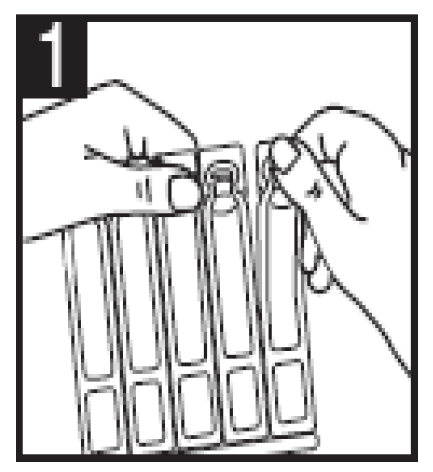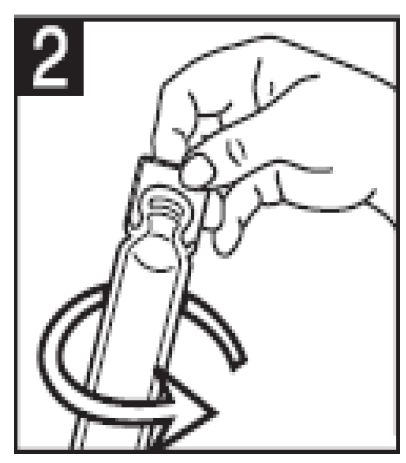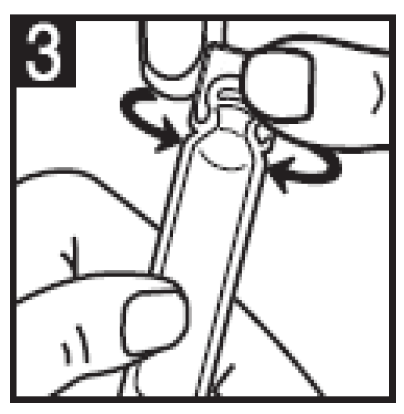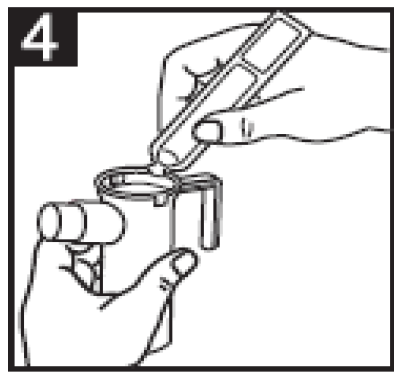
Resbud
Ask a doctor about a prescription for Resbud

How to use Resbud
Package Leaflet: Information for the Patient
Resbud, 0.25 mg/mL, Nebulizer Suspension
Resbud, 0.50 mg/mL, Nebulizer Suspension
Budesonide
Read the package leaflet carefully before using the medicine, as it contains important information for the patient.
- Keep this leaflet, you may need to read it again.
- If you have any further questions, ask your doctor or pharmacist.
- This medicine has been prescribed for you only. Do not pass it on to others. It may harm them, even if their symptoms are the same as yours.
- If you experience any side effects, including any not listed in this leaflet, please tell your doctor or pharmacist. See section 4.
Table of Contents of the Leaflet
- 1. What is Resbud and what is it used for
- 2. Important information before using Resbud
- 3. How to use Resbud
- 4. Possible side effects
- 5. How to store Resbud
- 6. Contents of the pack and other information
1. What is Resbud and what is it used for
Budesonide, the active substance of Resbud, belongs to a group of medicines called corticosteroids. These medicines have local anti-inflammatory effects. Resbud is used:
- in patients with asthma who require long-term administration of corticosteroids to control the inflammatory process in the respiratory system. The cause of asthma is inflammation of the respiratory system. Nebulizers are recommended when the use of pressurized inhalers (pMDI) or dry powder inhalers (DPI) is unsatisfactory or unjustified.
- in patients with croup syndrome - acute laryngitis, tracheitis, and bronchitis - regardless of etiology, associated with significant narrowing of the upper airways, shortness of breath, or "barking" cough, leading to respiratory disorders.
- for the treatment of exacerbations of chronic obstructive pulmonary disease (COPD), when the use of budesonide in the form of a nebulizer suspension is justified. COPD is a chronic lung disease that causes shortness of breath and cough.
2. Important information before using Resbud
When not to use Resbud
- if the patient is hypersensitive (allergic) to budesonide or any of the other ingredients of Resbud (listed in section 6).
Page 1 9
Inform your doctor about any worrying reactions that have occurred after taking a medicine containing budesonide or any other ingredient of Resbud.
Warnings and precautions
Resbud is intended for long-term treatment, but it does not provide quick relief of acute asthma attacks, for which short-acting bronchodilators are indicated.
If there is no noticeable improvement after using short-acting bronchodilators or if they need to be used more frequently than usual, you should consult your doctor.
In such cases, your doctor may consider more effective anti-inflammatory treatment, for example, by increasing the dose of inhaled budesonide or starting oral corticosteroid treatment.
Particular caution is required when switching from oral corticosteroids to inhaled products. During this period, transient adrenal insufficiency may occur.
Patients who have recently required high doses of oral corticosteroids or long-term treatment with the highest recommended doses of inhaled corticosteroids are also at increased risk of adrenal insufficiency when exposed to stressful situations. You should inform your doctor about anticipated stressful situations (e.g., exams) or planned surgical procedures.
Your doctor may consider increasing the dose of oral corticosteroids.
NOTE:If you are switching from oral corticosteroid treatment to Resbud nebulizer suspension, you may temporarily experience the following symptoms: runny nose, rash, muscle and joint pain. In the event of allergic reactions, such as runny nose or rash, your doctor may recommend treatment with antihistamines and/or local-acting drugs. If any of the symptoms are severe or worrying, or if symptoms such as headache, fatigue, nausea, or vomiting occur, you should contact your doctor. Your doctor may recommend temporary increase in the dose of oral corticosteroids.
Regular monitoring of growth in children and adolescents taking corticosteroids, regardless of the route of administration, is recommended due to the risk of growth retardation. If growth is slowed, your doctor may review the treatment and reduce the corticosteroid dose.
Before starting treatment, inform your doctor about any other diseases or conditions you have, especially:
- active or recent infections,
- liver function disorders. You should also consult your doctor if the above warnings apply to past situations.
As with other inhaled medicines, paradoxical bronchospasm may occur immediately after using Resbud. If a severe reaction occurs, you should stop using the medicine and consult your doctor immediately.
Inhaled corticosteroids may cause fungal infections in the mouth. Such infections may require appropriate antifungal therapy and, in some patients, discontinuation of inhaled corticosteroids.
You should also consult your doctor if the symptoms of the disease do not improve despite regular use of the recommended doses of the medicine.
If you experience blurred vision or other vision disturbances, you should contact your doctor.
Page 2 9
Children
The medicine can be used to treat asthma in children from 6 months of age. The doctor will determine the dose of the medicine individually for each patient.
Resbud and other medicines
Tell your doctor about all medicines you are currently taking or have recently taken, including those available without a prescription, as well as any medicines you plan to take.
Inform your doctor about any worrying reactions that have occurred after taking other medicines.
Particularly, inform your doctor about any antifungal medicines you are taking, such as ketoconazole or itraconazole (which are potent inhibitors of the CYP 3A4 isoenzyme), and HIV protease inhibitors, such as ritonavir and atazanavir, which may increase the concentration of budesonide in the blood. If concomitant use of such medicines with Resbud is necessary, the interval between doses of individual medicines should be as long as possible, and your doctor may recommend reducing the dose of budesonide.
No interaction of budesonide with other medicines used to treat asthma has been observed.
Pregnancy and breastfeeding
Pregnancy
If you are pregnant or planning to become pregnant, you should consult your doctor before using the medicine - do not use the medicine unless your doctor recommends it.
If you become pregnant while taking Resbud, do not stop treatment on your own, but inform your doctor as soon as possible.
Breastfeeding
If you are breastfeeding, you should consult your doctor before using this medicine.
Driving and using machines
Resbud does not affect the ability to drive or use machines.
3. How to use Resbud
This medicine should always be used as directed by your doctor.
The dosage of Resbud nebulizer suspension is determined individually.
If you have any doubts, you should consult your doctor again.
Resbud nebulizer suspension can only be used with a jet nebulizer (PARI LC PLUS) equipped with a mouthpiece or a suitable face mask and a compressor (PARI BOY SX). The medicine is delivered to the lungs during inhalation through the mouthpiece or face mask.
Before using the medicine, you should carefully read the "Instructions for using Resbud nebulizer suspension" below and follow the instructions.
Remember to rinse your mouth with water after each inhalation. If a face mask was used, you should also wash your face after each inhalation.
NOTE:Do not use an ultrasonic nebulizer to administer budesonide nebulizer suspension.
Asthma
Initial dose
Page 3 9
The recommended initial dose for children from 6 months of age: the total daily dose is from 0.25 mg to 0.5 mg. If the child is taking an oral corticosteroid, the doctor may increase the daily dose to 1 mg if necessary.
The recommended initial dose for adults and the elderly: from 1 mg to 2 mg per day.
Your doctor may change the dosage after some time.
Maintenance dose
The smallest effective maintenance dose is recommended.
Children from 6 months of age: the total daily dose is from 0.25 mg to 2 mg.
Adults, including the elderly: the total daily dose is from 0.5 mg to 4 mg.
If the symptoms are very severe, the doctor may increase the dose of the medicine.
If the daily dose is up to 1 mg, the medicine can be administered once a day in the morning or evening.
If you feel that the effect of the medicine is too strong or too weak, you should consult your doctor.
If the patient's condition improves, the doctor may decide to reduce the dose of the medicine.
Improvement in the patient's condition after using Resbud may occur within a few hours of starting treatment. The full therapeutic effect is achieved after a few weeks of treatment.
Resbud should be used even when symptoms of the disease are not present.
Patient's taking oral corticosteroids
Resbud nebulizer suspension may be prescribed to a patient who is taking oral corticosteroids.
Resbud nebulizer suspension can partially or completely replace oral corticosteroids while maintaining the same or increased efficacy of treatment.
The gradual reduction of the oral corticosteroid dose should be recommended by the doctor.
When switching from oral corticosteroids to inhaled products, the patient should be in a stable condition.
For 10 days, it is recommended to use high doses of Resbud in combination with the previously used oral corticosteroid at an unchanged dose. Then, the dose of the oral corticosteroid should be gradually reduced by about 2.5 mg of prednisolone or an equivalent dose of another corticosteroid per month to the smallest dose that controls the symptoms of the disease. Often, the use of oral corticosteroids can be completely stopped.
Budesonide administered to the patient in the form of a nebulizer suspension is delivered to the lungs during inhalation. It is very important that the patient performs calm, even inhalations through the nebulizer mouthpiece or face mask.
Croup syndrome
The usual dose used in infants and children with croup syndrome is 2 mg of budesonide administered via nebulization. This dose can be administered in its entirety or divided into two doses of 1 mg at 30-minute intervals. This dosing regimen can be repeated every 12 hours, up to 36 hours, or until the patient's condition improves.
Exacerbations of COPD
Based on limited clinical trial data, the recommended dose of Resbud nebulizer suspension is from 4 to 8 mg per day, divided into 2 to 4 doses. Treatment should be continued until clinical improvement is achieved, but not for more than 10 days.
Instructions for using Resbud nebulizer suspension
- 1. Separate the required number of ampoules from the strip. Leave the remaining ampoules in the medicinal bag.
Page 4 9

- 2. Before using the ampoule, gently mix the contents by rotating it. Figure 2

- 3. Holding the ampoule upright, without pressing, (see Figure 3), open the ampoule by twisting the top - "wing".

- 4. Place the open end of the ampoule into the nebulizer chamber and slowly squeeze the contents of the ampoule into the chamber, as shown in Figure 4.

- 5. Discard the empty ampoule. Close the nebulizer lid.
- 6. Connect the face mask or mouthpiece to the nebulizer, according to the device's instructions.
- 7. Connect the nebulizer outlet to the compressor.
Page 5 9
- 8. Turn on the compressor. Using the face mask or mouthpiece, breathe in the "mist" calmly and deeply, sitting or standing upright. If you are using a face mask, make sure it fits well.
- 9. You will notice when the inhalation of the medicine is complete, as no more "mist" will appear in the mouthpiece or face mask.
- 10. The duration of nebulization depends on the type of equipment used and will also depend on the volume of the nebulizer suspension used.
- 11. After inhalation, a few drops of the medicine will remain in the nebulizer.
- 12. After inhalation, rinse your mouth with water. Spit out the water. Do not swallow. If you used a face mask, also wash your face with water.
- 13. After each use, the nebulizer medicine reservoir and mouthpiece (or face mask) should be washed with warm running water using a mild detergent recommended by the nebulizer manufacturer. Then, rinse the nebulizer chamber thoroughly and dry it by connecting the compressor to the outlet.
Using a higher dose of Resbud than recommended
It is important to use the medicine as directed in the leaflet or as recommended by your doctor. Do not increase or decrease the dose of the medicine without consulting your doctor.
If you have taken a higher dose of the medicine than recommended, you should consult your doctor or pharmacist immediately.
If a higher dose of Resbud has been used once, it is unlikely to cause harm.
If doses higher than those recommended by your doctor have been used for a long time, there is a possibility of side effects such as those that occur with oral corticosteroids, i.e., increased levels of adrenal hormones in the blood and suppression of adrenal function. In this case, your doctor should recommend continuing treatment with Resbud in doses that keep the symptoms of asthma under control.
Missing a dose of Resbud
If you have missed one of the recommended doses of Resbud nebulizer suspension, there is no need to make up for the missed dose. You should take the next dose of the medicine as recommended by your doctor. Do not use a double dose to make up for the missed dose.
If you have any further questions about using this medicine, you should consult your doctor or pharmacist.
4. Possible side effects
Like all medicines, Resbud can cause side effects, although not everybody gets them.
If you experience any of the following symptoms, stop using Resbud and consult your doctor immediately:
- swelling of the face, especially around the mouth, tongue, eyes, and ears, rash, itching, contact dermatitis, urticaria, and bronchospasm (constriction of the airway muscles, which causes wheezing). This may indicate an allergic reaction. This side effect is rare (less than 1 in 1,000 people).
- sudden onset of wheezing after inhaling the medicine. This side effect is rare (less than 1 in 1,000 people).
Other possible side effects:
Common (occurring in less than 1 in 10 people)
- thrush (fungal infections) in the mouth. To reduce the risk of their occurrence, you should rinse your mouth with water after using Resbud;
Page 6 9
- sore throat, cough, and hoarseness, loss of voice;
- pneumonia (lung infection) in patients with COPD. You should tell your doctor if any of the following symptoms occur while using budesonide; these may be symptoms of a lung infection:
- fever or chills,
- increased production of mucus, change in mucus color,
- worsening cough or increased breathing difficulties.
Uncommon (occurring in less than 1 in 100 people)
- cataract (clouding of the lens of the eye);
- blurred vision;
- muscle cramps;
- muscle tremors;
- depression;
- anxiety.
Rare (occurring in less than 1 in 1,000 people)
- rash on the face after using a face mask. This can be prevented by washing your face with water after using the face mask;
- nervousness, behavioral changes (mainly in children);
- easy bruising;
- hoarseness and loss of voice (in children).
Side effects with unknown frequency (frequency cannot be estimated from available data)
- sleep disturbances, anxiety, excessive excitement, aggression.
The use of inhaled corticosteroids may affect the normal production of steroid hormones in the body, especially if used for a long time in high doses. Side effects such as:
- glaucoma (increased intraocular pressure), frequency not known;
- growth retardation in children and adolescents (rare);
- effect on the adrenal glands (a small gland near the kidneys) (rare). The occurrence of these side effects after using inhaled corticosteroids is less likely than after oral corticosteroids.
Reporting side effects
If you experience any side effects, including any not listed in this leaflet, you should tell your doctor or pharmacist. Side effects can be reported directly to the Department of Drug Safety Monitoring of the Office for Registration of Medicinal Products, Medical Devices, and Biocidal Products.
Al. Jerozolimskie 181C
02-222 Warsaw
tel.: +48 22 49 21 301
fax: +48 22 49 21 309
Website: https://smz.ezdrowie.gov.pl
Side effects can also be reported to the marketing authorization holder.
By reporting side effects, you can help provide more information on the safety of this medicine.
5. How to store Resbud
Page 7 9
Keep the medicine out of the sight and reach of children.
Do not use this medicine after the expiry date stated on the packaging after EXP.:.
The expiry date refers to the last day of the month stated.
Do not store in the refrigerator or freeze. Ampoules should be stored in the medicinal bag to protect them from light.
The shelf life of the medicine after opening the medicinal bag is 3 months. NOTE: You should write the date of opening on the bag.
After opening the ampoule: if the contents of the ampoule are not used immediately, the remaining medicine should be discarded.
Medicines should not be disposed of via wastewater or household waste. You should ask your pharmacist how to dispose of medicines that are no longer needed. This will help protect the environment.
6. Contents of the pack and other information
What Resbud contains
- The active substance of Resbud is budesonide. 1 mL of the nebulizer suspension contains 0.25 mg or 0.50 mg of budesonide. 1 ampoule contains 0.5 mg or 1 mg of budesonide in 2 mL of nebulizer suspension.
- The other ingredients are: polysorbate 80, sodium chloride, disodium edetate, sodium citrate, citric acid monohydrate, water for injections.
What Resbud looks like and contents of the pack
White to almost white sterile suspension in an LDPE ampoule.
Each ampoule contains 2 milliliters (mL) of sterile nebulizer suspension.
The ampoule is made of LDPE, in a medicinal bag made of PET/Aluminum/PE, in a cardboard box.
1 bag contains 5 ampoules.
The pack contains 20, 40, or 60 ampoules.
Marketing authorization holder:
LEK-AM Pharmaceutical Company Ltd.
Ostrzykowizna 14A
05-170 Zakroczym
Tel.: +48 22 785 27 60
Fax: +48 22 785 27 60 ext. 106
Importer:
LEK-AM Pharmaceutical Company Ltd.
Ostrzykowizna 14A
05-170 Zakroczym
Tel.: +48 22 785 27 60
Fax: +48 22 785 27 60 ext. 106
Cipla Europe NV
De Keyserlei 58-60 bus 19,
Antwerp,
2018, Belgium
Page 8 9
Date of last revision of the leaflet:
- 07.2024
Page 9 9
- Country of registration
- Active substance
- Prescription requiredNo
- ImporterCipla Europe N Przedsiębiorstwo Farmaceutyczne LEK-AM Sp. z o.o.
- This information is for reference only and does not constitute medical advice. Always consult a licensed doctor before taking any medication. Oladoctor is not responsible for medical decisions based on this content.
- Alternatives to ResbudDosage form: Suspension, 0.125 mg/mlActive substance: budesonidePrescription requiredDosage form: Suspension, 0.25 mg/mlActive substance: budesonidePrescription requiredDosage form: Suspension, 0.5 mg/mlActive substance: budesonidePrescription required
Alternatives to Resbud in other countries
The best alternatives with the same active ingredient and therapeutic effect.
Alternative to Resbud in Ukraine
Alternative to Resbud in Spain
Online doctors for Resbud
Discuss dosage, side effects, interactions, contraindications, and prescription renewal for Resbud – subject to medical assessment and local rules.















